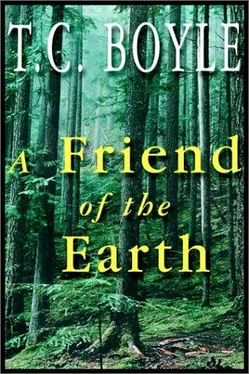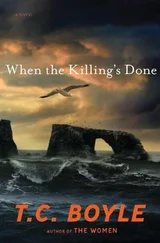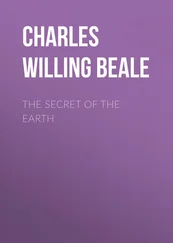(Ultimately? The way I felt that day? I welcomed them, welcomed them all: Here's my flesh, I murmured-said it aloud-here's my flesh. Come and get it.) They didn't have a permit either.
We don't want to look hypocritical, Andrea had argued, because what are people going to think if we go out there and violate the rules like the Freemen and the Phineas Priests and all the rest of the self-righteous back-to — the-earth yahoos? But Tierwater knew they would have to violate the rules systematically if they were going to get through this-let alone make a statement. What kind of statement would they make if they gave up? Or, worse, died? This was an experiment, and the wilderness was the laboratory. They would do what they had to do to survive-that was the point, wasn't it? Catch and release. Did the Bushmen practice catch and release? And what about Great-grandfather Knowles-had he lived on air while wandering the Maine woods?
It was past six and getting cool in the gorge by the time they found a likely-looking place to make camp, a tongue of sand thrown up against a wall of rock on the far side of the river. They waded across, the river no more than thirty feet wide and two or three feet deep at this juncture, and the frigid racing water felt good on their battered feet and sunburned legs. They'd agreed that their main priority the first night would be constructing a shelter-food they'd worry about in the morning. And so, dutifully, Tierwater and his wife had begun gathering brush and leaves to construct a debris shelter according to the instructions in one of the wilderness-survival manuals they'd found on Ratchiss' shelf. It was a pretty rudimentary affair: just prop a pole up on a stump or rock three feet off the ground, lay sticks against either side of it and cover the whole business with leaves and brush. Then line the interior with four or five armloads of spare leaves for bedding, and presto, you've got an insulated shelter for the night.
Dusk fell. A wall of cold air worked its way down the canyon foot by foot, settling into the low places, probing corners, retarding the metabolism of all those hidden snakes and scorpions and prickling the skin of Tierwater's chest with goosebumps. He was bent over a fireboard — a fragment of sun-bleached driftwood, that is-vigorously spinning a long, thin, very nearly straight drill of the same material. Andrea knelt beside him, fragments of brush in her hair, her breasts nicked and blemished from cradling armfuls of river-run debris, her big hands working in her lap. "Harder, Ty," she urged, "it's starting to smoke." And it was, it was, the spindle working in the groove as be furiously kneaded it between his palms, the faintest glimmer of a coal reddening the tip of the thing, friction, more friction, and Andrea blowing now, puffing for all she was worth. There it was — a coal! And the coal fired the kindling for the briefest, most desperate moment, before it died out in a faint little ribbon of smoke. By Tierwater's count, this was the twenty-seventh time the same scenario had played itself out in the course of the past hour. He was exhausted. His palms were raw. He sat heavily and let the cold air settle over his shoulders like the mantle of defeat.
It was then that the smell of a clean-burning campfire came to them, sharp and somehow delicious on the chill air. And the scent of food-some sort of sauce, tomato sauce, and the unmistakable aroma of fresh coffee. Tierwater drew his wife to him and held her in his arms, and it was the saddest moment of the whole adventure. They turned their heads in unison to gaze through the snarl of scrub willow in the riverbed to a point a hundred yards upstream. Through the screen of the bushes, they could just make out the figure of Chris Mattingly, crouched lovingly over his fire. And then, as faint as the first tentative murmur of the birds on a cold spring morning, a sound came to them, pitched low and melodic. He was singing. Cheered by the blaze and the wildness of the place and the intoxicating smell of the freeze-dried entrée he raised to his lips, bite by savory bite, Chris Mattingly was singing at the fall of day.
It got better, and then it got worse. In the morning, with a pain in his gut that twisted like the blunted stone head of a Bushman's arrow, Tierwater managed to get a fire going. He squatted beside it, his testicles dangling in the cool sand, and nurtured the weak dancing flame till it danced higher, into the nest of twigs and bark he'd prepared, and there it was: fire. It was a hungry little fire, and it chewed contentedly at everything he fed it, till finally he was dragging branches the size of coat racks out of the piles of river-run debris scattered along the spit and slamming them hard against the standing trees till they yielded the fuel he wanted, in convenient three-foot sections. He didn't know what time it was-only that it was light and that the chill had begun to lift — and he did a naked capering dance of triumph round the fire, kicking up his heels in the sand. They had fire. Fire!
While Andrea slept on, oblivious, her slack limbs encrusted with leaf mold and all the small but ferocious things that lived within it, Tierwater gathered firewood. He combed both sides of the river, keeping an eye out for fish or bird's nests or even snakes — and, yes, he'd be pleased and honored to indulge in a little roast rattlesnake for breakfast — and by the time the sun had climbed up over the eastern ridge of the gorge, he had enough fuel for a hundred fires stacked up round the shelter. But he wasn't done yet-no, this shelter would never do; it wasn't much more imposing than a suburban mulch pile, and all night, as insects crawled over him and fragments of leaves worked their way into his private parts and maddened him with itching, he envisioned a larger, airier shelter, a model of cleanliness and efficiency.
Something you could stand in, with pine boughs spread inside over the soft, clean sand. The thought of it made his spirits lift and soar, as if a fierce-eyed bird of prey had emerged from his body-climbed right up out of his throat — and shot into the sky. He'd never felt anything like it. Never. And then he was crouching in the hut, leaning over his wife to kiss her awake, the smell of her like some fermenting thing, like vinegar or curdled milk spilled on a patch of damp ground, bits of leaf mold stuck to her lips and forced up her nostrils, a scurry of insects frantically hopping and burrowing out of his calamitous way. "Wake up, baby," he said, pressing his lips to hers, the leaves rustling and fragmenting beneath them, and she woke to the smell of him, to the smell of smoke on him, and they made love in the twisted thrashing way of animals in the bush-for the third time since the but had gone up the night before. "I made fire," he told her, over and over, and she clutched at him with her big hands and powerful arms, pulling him into her with a furious urgency the but couldn't withstand. It rattled, it swayed, it fell, and they hardly noticed.
It was erotic, the primitive life, Tierwater was thinking-all those naked pot-bellied tribes in the jungles of South America and New Guinea, bare breasts, loincloths, penis sheaths, doing it in the hut, on a log, in the stream as the water sizzled round you — but it only took a day or two to disabuse him of that notion. The fact was that lust consumed calories, and in the final analysis calories were the only thing that mattered. Once their cells had been burned clean of fats, nitrates and cholesterol, once they understood that the odd fish, indifferently charred on a green stick, or a fistful of manzanita berries au naturel was it for the day-hold the butter, please, and no, I think I'll pass on the napoleons this evening — their erotic life came to a screeching halt. He saw his wife crouched there by the new and improved hut, weaving sticks into a primitive weir, her breasts pendulous, her skin so burned, abraded and chewed over it was like a scrub pad, and he barely glanced up. There's a naked woman, he thought, in the same way he might have thought, There's a tree or a rock.
Читать дальше












